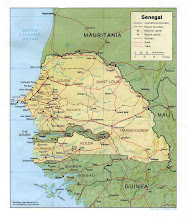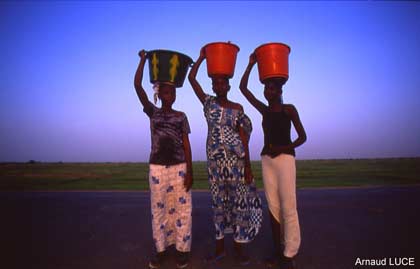The fate of Air Senegal is still up in the air according to new sources. After the withdrawal of Royal Moroccan from the airline, Karim Wade, the new infrastructure minister, says that a deal has been struck where Royal Moroccan will provide "operational support" while Senegal's government goes it alone.
But despite the optimism expressed by Karim Wade after the deal, the news reports say that major obstacles stand in the way of any liftoff for Air Senegal, including payments for two airplanes and the approval of the new operations by international air regulators.
Saturday, May 30, 2009
Friday, May 29, 2009
More roads but less maintenance
Transportation spending in Senegal has increased much in recent years with road projects like the Cornice and toll roads around Dakar. But keeping up roads across Senegal is underfunded by 50 percent, according to a recent meeting of Senegal business school and government leaders.
Transportation is a key economic development infrastructure. Administrative chief of the Directorate of Land Transport, Papa Souleymane Faye, one of the organizers of the conference, fears new road construction comes at the cost of overall system maintenance. Aging roads and bottlenecks are a growing feature.
One wonders whether Senegal has a capital maintenance program for its roads, adopted by most municipalities in the United States. Many American cities and counties have sophisticated computerized road maintenance programs. But regardless of the sophistication, it ultimately takes money to get it done...
Transportation is a key economic development infrastructure. Administrative chief of the Directorate of Land Transport, Papa Souleymane Faye, one of the organizers of the conference, fears new road construction comes at the cost of overall system maintenance. Aging roads and bottlenecks are a growing feature.
One wonders whether Senegal has a capital maintenance program for its roads, adopted by most municipalities in the United States. Many American cities and counties have sophisticated computerized road maintenance programs. But regardless of the sophistication, it ultimately takes money to get it done...
Labels:
infrastructure,
roads,
Senegal,
transportation
Tuesday, May 26, 2009
Senegal's fiscal discipline paying off
Senegal's government is starting to see some real benefits for the reforms it has made over the last year to its fiscal policies. Now, Standard & Poor's ratings have improved for Senegal's debt rating, now "B+" in the short-term and "B" for long-term notes. The outlook for government notes changed from "negative" from "stable".
According to the rating agency, the revision reflects "improving the management of public finances," such as progress made in establishing procedures for expenditures, more rigorous budget execution and the ban on cash advances. These improvements are added by statutory payment of arrears (3 percent of GDP in 2008) to suppliers and reducing the budget deficit on the basis of a target of 4 percent in 2009 (including grants) against 7 percent in 2008 (including arrears ). These two measures will help to maintain debt at sustainable levels.
Such discipline now will put Senegal in a strong position when the world economy revives.
According to the rating agency, the revision reflects "improving the management of public finances," such as progress made in establishing procedures for expenditures, more rigorous budget execution and the ban on cash advances. These improvements are added by statutory payment of arrears (3 percent of GDP in 2008) to suppliers and reducing the budget deficit on the basis of a target of 4 percent in 2009 (including grants) against 7 percent in 2008 (including arrears ). These two measures will help to maintain debt at sustainable levels.
Such discipline now will put Senegal in a strong position when the world economy revives.
Labels:
budget,
finance,
government,
notes,
Senegal
Friday, May 1, 2009
Karim Wade takes critical infrastructure ministry
Karim Wade has been appointed the "go to" guy for infrastructure in the Wade government. With the appointment by President Wade, he and his son appear to have shaken off the defeats of last month's local elections.
The junior Wade takes the title of Minister for Transportation and Infrastructure. The appointment is a natural fit for the front man of Senegal's "Concrete Generation" movement. The eager-beaver apparatchiks of the Generation de concrete have pushed modern world infrastructure in Senegal.
The newly minted minister's top priority is sure to be the flightless Air Senegal, its crumbled partnership with Royal Air Morac threatening to ground the national airline permanently, even as the new Dakar airport gets going.
Karim's new job is arguably the most significant in Senegal government. Karim Wade's success or failure will impact on Senegal's quest to be the capital of West Africa.
The junior Wade takes the title of Minister for Transportation and Infrastructure. The appointment is a natural fit for the front man of Senegal's "Concrete Generation" movement. The eager-beaver apparatchiks of the Generation de concrete have pushed modern world infrastructure in Senegal.
The newly minted minister's top priority is sure to be the flightless Air Senegal, its crumbled partnership with Royal Air Morac threatening to ground the national airline permanently, even as the new Dakar airport gets going.
Karim's new job is arguably the most significant in Senegal government. Karim Wade's success or failure will impact on Senegal's quest to be the capital of West Africa.
Labels:
Air Senegal,
airport,
infrastructure,
Karim Wade,
minister,
Royal Air Maroc,
transportation
Subscribe to:
Comments (Atom)


